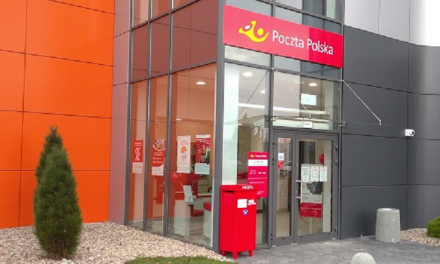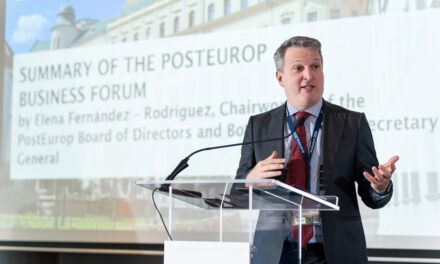
Growth is the key to the future
Botond Szebeny, secretary general at PostEurop, looks to the future with Post&Parcel. With Botond Szebeny now having his feet firmly under the table at PostEurop after several months in charge, the time was right to ask the secretary general about his organisations’ role in the industry, and the importance of investment and growth throughout the sector.
P&P: Who is PostEurop and what do they do?
BS: PostEurop is the association of public postal operators in Europe; it is important here to underline all these words. Under the umbrella of PostEurop you can find the 48 traditional postal operators from Europe – the traditional universal service provider company, the incumbent. PostEurop is the industry association of these European companies. It covers the whole of Europe from Portugal to Russia, from Iceland to Turkey, from Finland to Malta and Cyprus. So we have a geographical scope, and as such, with 48 members we cover both the big postal operators like DHL, Royal Mail, TNT, La Poste France, Poste Italiane, Correos, Russian Post, but we also have smaller members such as Poste Slovenije, MaltaPost and Posta Shqiptare. And PostEurop is the voice of the European postal industry, or at least this is our objective that we develop this skill. We play a double role in the life of our members. On the one hand, we try to defend the interests of our members towards the European Union decision makers as well as within the Universal Postal Union (UPU); but we also want to represent the industry to the stakeholders coming from other industries, like the paper, print industry as well as envelope manufacturers. So this is one aspect of our work, representing the European postal industry. On the other hand, we have quite some internal activities as well, like providing a platform for the exchange of information; know-how; best practice and development among our members.
P&P: Do PostEurop ever deal with non-European countries?
BS: Currently we represent only the European postal operators; however, we have contacts with the representative associations of other continents as well, mainly through the Universal Postal Union (UPU). So PostEurop is one of the so-called restricted unions of the UPU. It is a regional union so we have this kind of worldwide contact network as well, but our aim is to defend the interests of our European members.
P&P: So you are fairly new to the role at PostEurop, how are you finding the job?
BS: I have been in this position for more than half a year. It has brought huge change in my life. Prior to this change I had been the executive director for international business at Magyar Posta. So I already had a certain international role that I had to play. I was also a member of the management board of PostEurop at that time so I had to play a role in the international arena. However, to be here in Brussels, as the secretary general of PostEurop, has definitely been a huge challenge for me as I don’t represent just one company, but I have to represent the interest of all our 48 members. This gives me an extra responsibility to find the common platform, first among our members, and then afterwards to do my best in order that this voice is heard by our partners. So it is challenging work on a European level, but I like being part of this international playing field. My experience in the role has so far been more or less what I expected, and I will do everything that is needed in order that PostEurop is seen as a strong, powerful representative of our European members.
P&P: Why have PostEurop decided to sponsor the Growth award at the World Mail Awards?
BS: PostEurop currently has a four pillar strategy: firstly, we are involved in the postal regulatory affairs in the European Union and UPU. The second pillar is the operations pillar, which covers the quality of service development project activities at PostEurop. We have a social responsibility pillar, mainly linked to the human resource aspect of the postal operations; we know this is a human resources intensive industry. And last but not least, one of our strategic pillars is the market development pillar. Sponsoring the growth award within this framework is closely-linked to our activities within the market development area. There, are main objective is to promote the value of mail. So as I already mentioned, PostEurop is an industry association, and so our aim is to represent the general interest of the European postal operators. And sometimes when we talk about the speed of liberalisation and the details of the deregulation process then we tend to forget that the demonopolisation is about the repartition of the different pieces of a certain cake. But, it is also important – and I think that this could be one of the roles of an industry association like PostEurop – to contribute to the increase of the size of the cake; I think that this is the name of the game. PostEurop is very well positioned on behalf of our members to promote the value of the postal products, promote the value of mail, mainly in the short run. But of course in the mid and long-term, PostEurop would also like to play a role in promoting the value of new products as well. In the recent period we could see a decrease in mail volumes, on the one hand generated by the worldwide economic downturn; on the other hand generated by the e-substitution. However I think that postal operators should not accept this trend; instead they should fight in order to defend the traditional mail sector as much as possible. Maybe it is unrealistic to increase the volumes, but I think it is important to preserve the current size of the cake at least, and to add to this cake new products. This is something that could be facilitated by an industry association like PostEurop. And through sponsoring the Growth Award we want to highlight our commitment towards these ideas of promoting the general market interest of the postal industry and of our postal operators.
P&P: So with the recession, and also the declining volumes, growth is now the most important aspect for postal companies in the next few years…?
BS: Exactly, and that is the point here. In the time of recession and e-substitution, in the short term the postal operators could fight to maintain the current level of profitability by making cost cutting measures. But, only having cost cuttings within a company can easily lead to a downward spiral. I think that it is important for everybody to understand that the long term business sustainability of postal operators very much depends on the growth in their revenue potential. So with cost cutting you can reach only a short term result. But in the long term, the health and the development of the postal operators and the postal market could be only guaranteed by finding new ways of selling postal products and services. So through promoting the value of paper; of mail; re-inventing the mail; promoting the usage of direct mail; but also through introducing new products around e-commerce or financial services. There are plenty of possibilities so growth is a key word as you said in this regard. We all have to work together in order to find the potentials for growth in the postal market, and PostEurop wants to play a role in that process.
P&P: So where would you see the postal industry in five years time?
BS: I think that the postal industry has changed a lot already in recent years. I actually joined the industry 11 years ago, and at that time it was still an administration type industry, with close links to the government. In the mean time, the commercialisation of the European postal industry, mainly within the European Union, but also in other countries, has happened. Postal companies have diversified their portfolios – some of the companies have changed even their statutes, some have been privatised. So I think that this process of commercialisation of the postal companies, combined with the liberalisation of the market will definitely bring a lot of changes in the sector. If you asked me what I would say regarding the five year development scenario, it is not a dying industry. Moreover I think that the postal operators are aware of the fact that they have to invest in growth; re-invent the traditional part of the business; they have to diversify their portfolios; and they have to launch new products. So in five years time I think it will be a flourishing or rather a developing industry in good shape, but maybe with some new elements in comparison to what we have today. It all depends on the innovative minds of postal operators and I think that most of the operators, if not all of them, have this kind of internal power to be as innovative as is required by the social, economic and the general environment.
PostEurop is the proud sponsor of the Growth Award at the 2010 World Mail Awards, to be held in Copenhagen on June 15. The event takes place on the eve of the World Mail & Express Europe Conference & Exhibition, were Botond will also be speaking. To book your place at the World Mail Awards, please click here to download a booking form. Alternatively, to attend the Awards ceremony and the World Mail & Express Europe Conference & Exhibition, please click here to book online.














Very interesting points here. It is vital that Posts pro-actively innovate to strengthen their businesses. I can see many of the Posts taking up Hybrid Mail sooner rather than later. I am excited by this.